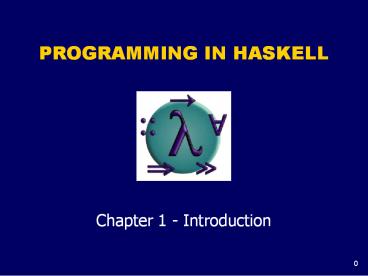Functional Programming - PowerPoint PPT Presentation
Title:
Functional Programming
Description:
Alonzo Church develops the lambda calculus, a simple but powerful theory of functions. ... language, based strongly on the lambda calculus, with no assignments. ... – PowerPoint PPT presentation
Number of Views:38
Avg rating:3.0/5.0
Title: Functional Programming
1
PROGRAMMING IN HASKELL
Chapter 1 - Introduction
2
The Software Crisis
- How can we cope with the size and complexity of
modern computer programs? - How can we reduce the time and cost of program
development? - How can we increase our confidence that the
finished programs work correctly?
3
Programming Languages
One approach to the software crisis is to design
new programming languages that
- Allow programs to be written clearly, concisely,
and at a high-level of abstraction - Support reusable software components
- Encourage the use of formal verification
4
- Permit rapid prototyping
- Provide powerful problem-solving tools.
Functional languages provide a particularly
elegant framework in which to address these goals.
3
5
What is a Functional Language?
Opinions differ, and it is difficult to give a
precise definition, but generally speaking
- Functional programming is style of programming in
which the basic method of computation is the
application of functions to arguments - A functional language is one that supports and
encourages the functional style.
6
Example
Summing the integers 1 to 10 in Java
total 0 for (i 1 i ? 10 i) total
totali
The computation method is variable assignment.
5
7
Example
Summing the integers 1 to 10 in Haskell
sum 1..10
The computation method is function application.
6
8
Historical Background
1930s
Alonzo Church develops the lambda calculus, a
simple but powerful theory of functions.
7
9
Historical Background
1950s
John McCarthy develops Lisp, the first functional
language, with some influences from the lambda
calculus, but retaining variable assignments.
8
10
Historical Background
1960s
Peter Landin develops ISWIM, the first pure
functional language, based strongly on the lambda
calculus, with no assignments.
9
11
Historical Background
1970s
John Backus develops FP, a functional language
that emphasizes higher-order functions and
reasoning about programs.
10
12
Historical Background
1970s
Robin Milner and others develop ML, the first
modern functional language, which introduced type
inference and polymorphic types.
11
13
Historical Background
1970s - 1980s
David Turner develops a number of lazy functional
languages, culminating in the Miranda system.
12
14
Historical Background
1987
An international committee of researchers
initiates the development of Haskell, a standard
lazy functional language.
13
15
Historical Background
2003
The committee publishes the Haskell 98 report,
defining a stable version of the language.
14
16
Historical Background
2003-date
Standard distribution, library support, new
language features, development tools, use in
industry, influence on other languages, etc.
15
17
A Taste of Haskell
f f (xxs) f ys x f zs
where ys a a ? xs, a ?
x zs b b ? xs, b gt x
?
16































